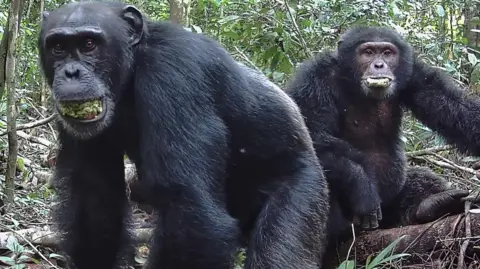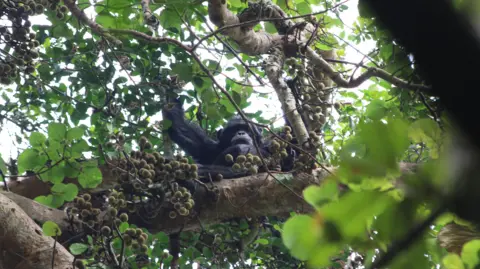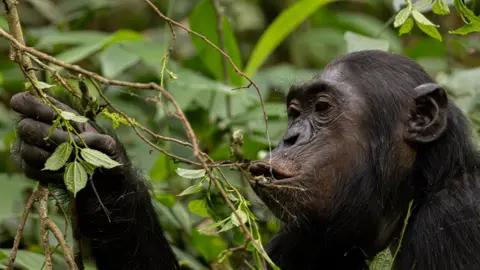Elizabeth Dawson and Helen BriggsBBC climate and science team

 Aleksey Maro
Aleksey Maro
Understanding more about the diet of wild chimps could help explain human attraction to alcohol
Wild chimpanzees have been found to consume the equivalent of a bottle of lager's alcohol a day from eating ripened fruit, scientists say.
They say this is evidence humans may have got our taste for alcohol from common primate ancestors who relied on fermented fruit - a source of sugar and alcohol - for food.
"Human attraction to alcohol probably arose from this dietary heritage of our common ancestor with chimpanzees," said study researcher Aleksey Maro of the University of California, Berkeley.
Chimps, like many other animals, have been spotted feeding on ripe fruit lying on the forest floor, but this is the first study to make clear how much alcohol they might be consuming.
The research team measured the amount of ethanol, or pure alcohol, in fruits such as figs and plums eaten in large quantities by wild chimps in Côte d'Ivoire and Uganda.
Based on the amount of fruit they normally eat, the chimps were ingesting around 14 grams of ethanol - equivalent to nearly two UK units, or roughly one 330ml bottle of lager.
The fruits most commonly eaten were those highest in alcohol content.

 Aleksey Maro
Aleksey Maro
Figs are a significant part of the diet for many primates, including chimpanzees
The research adds weight to the so-called "drunken monkey" hypothesis - the idea that the human appetite for alcohol was inherited from our primate ancestors.
This was first proposed by Prof Robert Dudley of the University of California, Berkeley, who is a co-researcher on the study.
Scientists were initially sceptical. But more observations of "scrumping apes" have emerged in recent years, said Prof Catherine Hobaiter, a primatologist at the University of St Andrews, who was not part of the research team.
"What we're realising from this work is that our relationship with alcohol goes deep back into evolutionary time, probably about 30 million years," she told BBC News.
"Maybe for chimpanzees, this is a great way to create social bonds, to hang out together on the forest floor, eating those fallen fruits."

 Getty Images
Getty Images
Wild chimpanzees in Uganda are under threat from deforestation and climate change
Dr Kimberley Hockings, who studies primates at the University of Exeter and was not involved in the research, said it was important to note that the chimpanzees in this study were not consuming enough alcohol to become drunk. Had they done so, "this would clearly not improve their survival chances," she said.
According to the International Union for the Conservation of Nature, chimpanzees are endangered and the biggest threats they face include losing their forest homes to farming, logging and building roads or towns.
The research is published in the journal Science Advances.

 3 weeks ago
8
3 weeks ago
8

















































